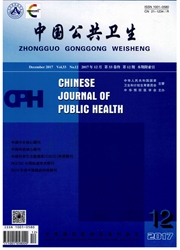

 中文摘要:
中文摘要:
目的 了解艾滋病高发区性病门诊患者的艾滋病(AIDS)相关知识和行为状况,为制定防治策略和措施提供参考依据。方法 以安徽省7个艾滋病综合示范区的县级医疗机构的性病门诊为单位,采取整群随机抽样的方法,抽取一定时段内门诊患者,由当地卫生专业人员担当调查员,用结构化问卷。以面访形式对患者进行调查。结果 共收集有效问卷952份,应答率为95.2%.艾滋病相关知识总体知晓率为77.8%,对传播途径、防治知识和非传播途径的知晓率分别为83.0%,76.1%和74.1%;男性和中青年知识掌握情况较好,最近3个月内有非婚性伴者260人(27.3%),其中男性36.1%,女性7.5%;与非婚性伴发生性关系时从不使用安全套者127人(48.7%),每次都用者仅10人(3.8%)。结论 安徽省艾滋病综合示范区性病门诊患者的AIDS相关知识水平还有待提高,尤其是女性和年长者。安全套使用比例相对较低,行为干预应从知识宣传向促进安全性行为转变。
 英文摘要:
英文摘要:
Objective To explore HIV/AIDS- related knowledge and behaviors among sexually transmitted disease (STD) outpatients in China CARE sites of Anhui province, and inform future interventions. Methods STD outpatients were drawn from STD clinics of health institutions in 7 China CARE site counties in Anhui province using randomized cluster - sampling, and interviewed by trained local CDC staff using structured questionnaire. Results A total of 952 patients were interviewed accounting for a response rate of 95.2 %. Their responses to HIV/AIDS - related knowledge questions were 77.8 % correct: The percentage of correct answers about transmission routes, prevention methods and non - transmission were 83.0 %, 76,1% and 74, 1% respectively. Male and younger respondents were better educated than female and elder ones, Of the 952 patients, 27.5 % had extra - marital sex in the recent three months, 48.7 % of them had never used condom during extra - marital sex, and only 3,8 % of them had been using condoms every time. Conclusion STD patients in rural Anhui are well educated about HIV/AIDS - related knowledge in general. However, female and elder patients are relatively less educated about HIV/AIDS, The patient' frequency of condom use is very low, These indicate that future intervention should be tailored to STD patients' educational needs and stress behavior change, especially for female and elder patients.
 同期刊论文项目
同期刊论文项目
 同项目期刊论文
同项目期刊论文
 期刊信息
期刊信息
